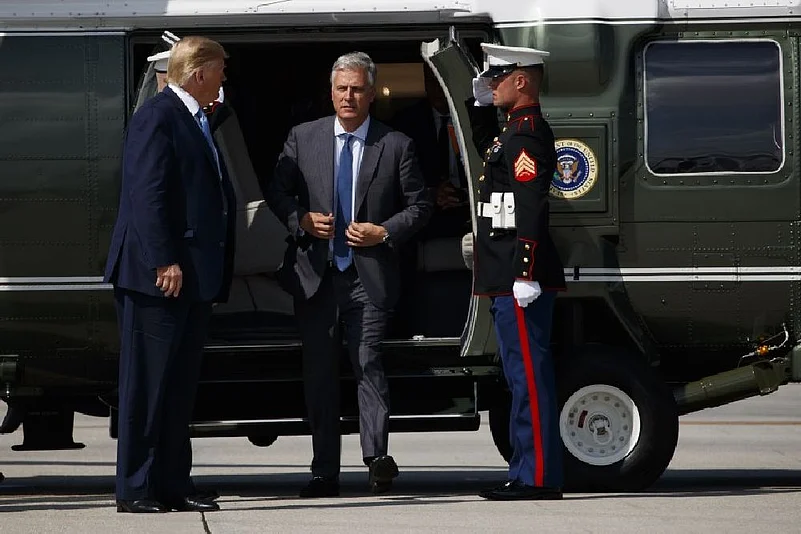“Hostage negotiation” should be a point of common interest between our National Security Adviser Ajit Doval and Robert O’Brien, the new American NSA. While Doval led negotiations with the Taliban in December 1999 to free the passengers in Indian Airlines 814 at Kandahar airport, O’Brien was appointed by President Trump as “Special Presidential Envoy for Hostage Affairs” in the US State Department in May 2018.
Till 2015, hostage negotiation was handled by individual American departments with no formal inter-agency coordination. On June 24, 2015, President Barack Obama announced that coordinated government efforts were necessary to obtain the release of US hostages from foreign countries.
This new office has to negotiate the release of not only “hostages” in the normal sense but also persons formally arrested even in friendly countries. On August 28, 2019, CNN published a list of 44 detainees, including 16 American NGO employees in “Friendly” Egypt. This office has also to anticipate the fallout on such detainees of sudden deterioration of bilateral political relations like how President Trump’s abrogation of Iran nuclear deal had affected four American detainees in Iran.
The question is: Would O’Brien be able to meet the elevated challenges in his new role of guiding US security policies and fine-tuning peace talks with hostile groups like the Taliban or bellicose nations? A case study of the US policy towards the Taliban will offer some clues as it would affect not only the US, Afghanistan and Pakistan but also India.
O’Brien’s first challenge is to restrain agencies from producing alarming assessments. On May 1, 2009, General David Petraeus, Commander of US Central Command was quoted saying that “the next two weeks” were critical to determining whether Pakistan government would survive against the Taliban onslaught. This went against Secretary of State Hillary Clinton’s assessment that the Taliban was not capable of toppling Islamabad.
On the other hand, O’Brien needs to be wary of interlocutors who promise the moon. The collapse of Taliban talks is an example. Zalmay Khalizad was too optimistic about the Taliban to acquiesce to the sidelining of the elected Kabul government. Taliban thought President Trump would agree to that in his hurry to clear out of Afghanistan before the 2020 elections.
Khalizad’s detractors say President Trump should never have reposed confidence in him after the failure of his earlier mission as “US Special Envoy” post-2001 Bonn Conference when he tried to do a “Tribal State building” in Afghanistan. They remind us that he had even written an Op-Ed in Washington Post on October 7, 1996, extolling Taliban’s capture of Kabul as an opportunity to peace. They say that he systematically sidelined anti-Taliban forces like President Rabbani and Vice President Marshal Fahim who were assassinated.
O’Brien needs to dredge up a 1992 monograph published by the “Center for the Study of Intelligence”, Washington DC (CIA’s think tank) as a guide to such tricky peace talks. This is based on the US experience during Angola, El Salvador, Mozambique, South Africa and Haiti peace talks. It lays down 5 phases: (I) Deciding US policy (2) Starting Talks (3) Vying for advantage (4) Creating a framework and (5) Ironing out Details. These apply mutatis mutandis to all countries, including India.
During the first phase, questions should be asked whether US national interests would be served through “Peace” bargaining and whether conditions could be made ripe through diplomatic manipulation of economic and military aid. The next question is examining the costs and benefits to US national security interests.
Critics say that these questions were never considered during the 2001 UN Bonn Conference. First, it was Afghan Northern Alliance which had chased the Taliban away from Afghanistan with the US intelligence and airpower support, without “US boots on the ground”. Secondly, the US could have continued supporting the Rabbani government to make a genuine democratic transition in Afghanistan.
Instead, under Khalizad’s pressure, the US agreed to deploy thousands of troops after the Bonn Conference to prevent India and Pakistan “backing their proxies” during a possible “civil war”, as a paper by the US National Defense University had said in 2011.
As a result, the Taliban regrouped and Pakistan’s role was strengthened after the transition of power from Rabbani to Karzai in 2001under Khalizad’s guidance as US Special Envoy and Ambassador.
(The writer is a former Special Secretary, Cabinet Secretariat. Views expressed are personal.)

















.jpg?w=200&auto=format%2Ccompress&fit=max)






